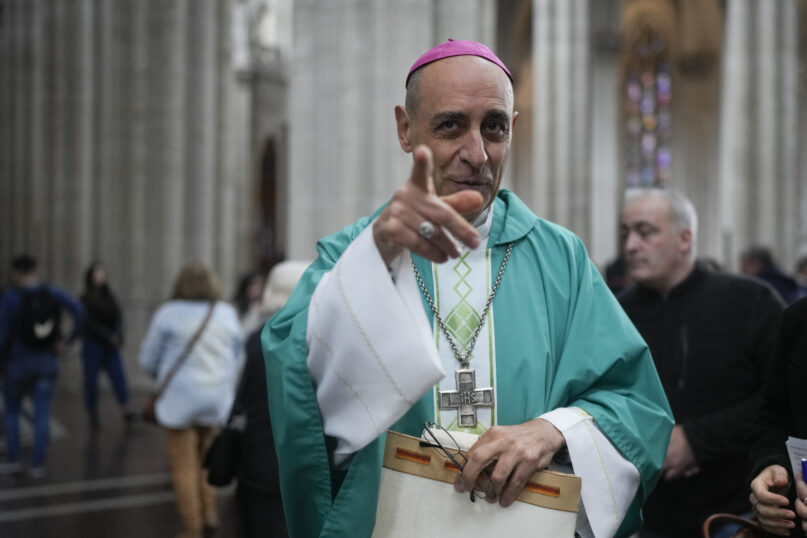(RNS) — Having grown up in the 1950s, when sex was not an approved topic, I was in my late 20s before I knowingly had a conversation with someone who was gay. It was not until much later that someone explicitly told me that they were gay. Today in America, high schools have gay-straight alliances and you’d be hard-pressed to find a teenager who doesn’t know someone who identifies as gay or queer.
Most of Africa’s Catholic bishops grew up in a culture like the one I grew up in, when being gay meant being in the closet. And they still live there. In many African countries, homosexual activity is still a crime, as it was in the West for most of the 20th century.
It’s not surprising that the African bishops have rejected Pope Francis’ decision to greenlight the blessing of gay couples and others in relationships outside of marriage. On Thursday (Jan. 11), with the pope’s approval, they issued a statement saying, “We do not consider it appropriate for Africa to bless homosexual unions or same-sex couples because, in our context, this would cause confusion and would be in direct contradiction to the cultural ethos of African communities.”
Besides the moral question, the African hierarchy sees the push for LGBTQ rights as a form of neocolonialism. In addition, if the church begins welcoming gay people, they fear, they may lose followers to Pentecostal and evangelical churches, whose ministers would attack them for being gay friendly.
Since the declaration allowing same-sex blessings was announced Dec. 12 by the Dicastery for Doctrine of the Faith, Cardinal Víctor Manuel Fernández, who heads the dicastery, has been forced to defend its orthodoxy. But he also gave bishops like the Africans room to disagree: “Prudence and attention to the ecclesial context and to the local culture could allow for different methods of application” of the new blessings rule, he has said.
It would be progress if the church in Africa would oppose the criminalization of homosexual activity. It is shameful that some bishops there publicly support laws against gay people. But blessing gays was a bridge too far in Africa.
Monday-morning quarterbacks will correctly argue that the Vatican should have anticipated the African response, consulted more widely and done a better job of rolling out the document. Perhaps it would have been better to have issued it as a letter to the church in Germany, where blessings are already occurring with the approval of local bishops, rather than as a declaration to the whole church.
But criticism of the new declaration, which is titled “Fiducia Supplicans,” is hardly limited to Africa. Even though the declaration clearly states that the blessing would be granted to gay couples “without officially validating their status or changing in any way the Church’s perennial teaching on marriage,” many Catholic conservatives in the West exploded in opposition to the document.
The vitriolic response is shocking and against every traditional deference to papal authority and church unity that the hierarchy owes the pope.
The last time that a large number of bishops publicly disagreed with a pope was over the 1968 encyclical “Humanae Vitae,” which forbade artificial birth control. Many bishops and theologians disagreed with Pope Paul VI, but these bishops expressed their views respectfully — unlike the bishops disagreeing with Francis — and urged couples to read the encyclical and then follow their consciences.
Most American couples followed their consciences rather than the pope. Today, very few American Catholic women completely abstain from artificial birth control in their fertile years. These liberal Catholics were called “cafeteria Catholics” by their critics because they picked and chose which papal teachings they would follow.
Nowadays, conservatives, who prided themselves on their loyalty to Popes John Paul II and Benedict XVI and castigated progressives when they disagreed with the popes, have become cafeteria Catholics, only worse: Not only do they pick and choose which of Francis’ teachings to support, they criticize him loudly and disrespectfully.
There is no indication that Jesus was as obsessed with people’s sex lives as modern Christians seem to be. Some theologians blame this on St. Augustine, whose sexual issues influenced his theology. Others point to the influence of the Stoics on Christian moral theology. Still others blame the fact that the church is run by a celibate clergy.
It should be remembered, however, that the church’s teaching on sex outside of marriage protected women who suffered from exploitation by men. The children of such unions also suffered. The only thing that could restrain men was the fear of eternal damnation.
Still less did Jesus concern himself with homosexuality, preaching instead about God’s love and compassion. He cared for the sick and the hungry and told us to do the same.
Critics blame priestly celibacy for the church’s obsession with homosexuality. Many gay Americans believe homophobic clerics are themselves suppressed homosexuals with issues of self-hatred. In any case, with all the other issues in the world such as wars, famines and global warming, why are we worried about what consenting adults do behind closed doors in their private lives?
Francis did the right thing in allowing priests to call God’s blessing down on couples who are trying to love in the best way they know how. In the West that may include gay couples; in Africa it may include people in polygamous relationships.
“Sometimes decisions are not accepted,” Francis said in an Italian television interview Thursday. “But in most cases, when you don’t accept a decision, it’s because you don’t understand.”
According to CNA, the pope underlined that “the Lord blesses everyone” and that a blessing is an invitation to enter into a conversation “to see what the road is that the Lord proposes to them.”
“The Lord blesses everyone who is capable of being baptized, that is, every person,” Francis said. “But we are to take them by the hand and help them go down that road, not condemn them from the beginning.”
The mere asking for a blessing reveals hearts that want to be in a positive relationship with God and the church. Turning such people away is cruel and un-Christian.






